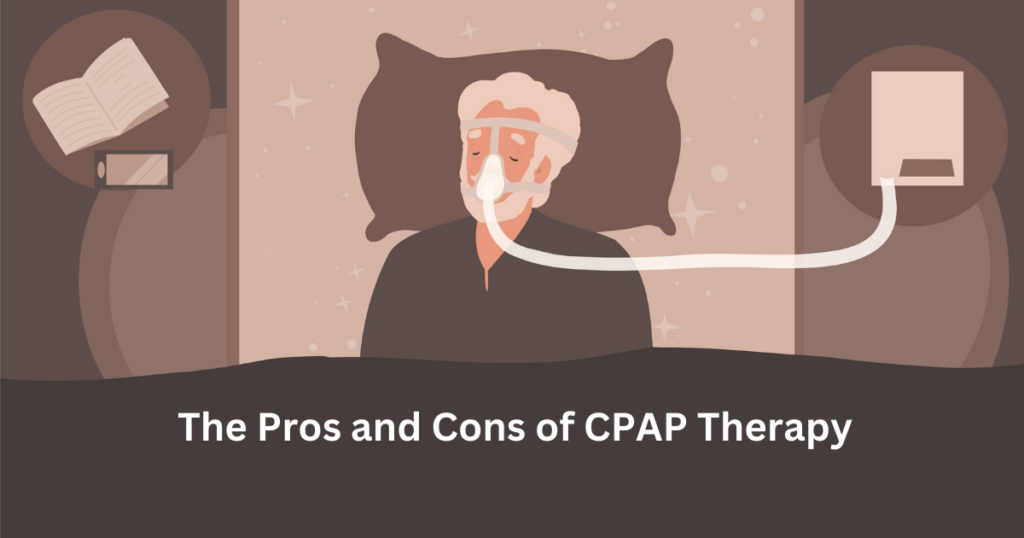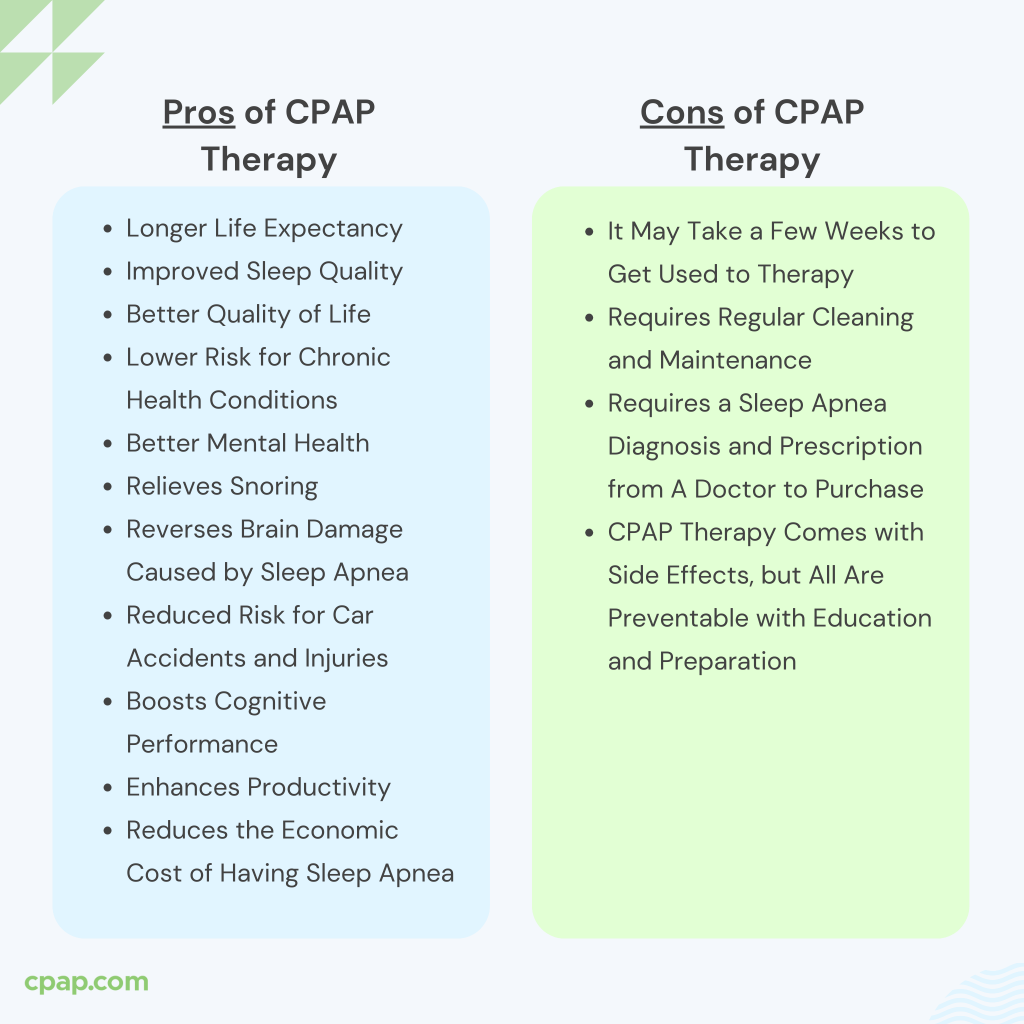
Sleep apnea can seriously impact your quality of life and long-term health. Luckily, it doesn’t have to ruin your life thanks to Continuous Positive Airway Pressure Therapy. Despite the many benefits, sleeping with a CPAP machine can take some getting used to and may cause some minor side effects. These often lead people to wonder if it’s really worth it.
So, is CPAP therapy right for you, and should you stick with it? Today, we’ll look closely at the pros and cons of CPAP and explain why we think the benefits of a CPAP machine really do outweigh the downsides!
What Are the Pros and Cons of CPAP Therapy?
The benefits of CPAP therapy include better quality of life, reduced risk for chronic health conditions, and lower chances of death. Drawbacks of CPAP therapy include uncomfortable side effects, difficulty adjusting to therapy, and upfront costs.

The Pros of CPAP Machines
CPAP machines are the go-to treatment for sleep apnea. By keeping your airway open during sleep and promoting a normal breathing pattern, these devices help to protect your body and your life from the damaging effects of sleep apnea!
Improved Sleep Quality
When discussing the pros and cons of treating sleep apnea with a CPAP machine, better sleep quality is what it’s all about! Sleep affects all other areas of life, so when you aren’t sleeping well, you can experience:
- Poor Mental Health
- Lower Quality of Life
- Damage to Your Brain
- Weakened Immune System
- Reduced Work Performance
- Poor Cognitive Function
A CPAP machine can significantly improve sleep duration and quality by reducing the number of sleep apnea events each night. Ultimately, sleeping with a CPAP means less snoring, more restful sleep, and far fewer disruptions to your sleep throughout the night.
Improved Quality of Life
Sleep apnea has been shown to significantly impact your daytime functioning, and researchers agree that any form of treatment for sleep apnea is better than none at all. By helping you sleep better, CPAP therapy improves your daily life by:
- Increasing Energy Levels
- Improving Mood
- Boosting Cognitive Function
- Closer Personal Connections
A 2021 study further concluded that long-term CPAP therapy improves sleep quality, reduces daytime sleepiness, and even alleviates symptoms of anxiety and depression. Furthering the quality of life argument is the finding that men treating their OSA with CPAP saw an improvement in sexual and intimate relationships with their partners.
Lowered Risk of Chronic Diseases
Between the loss of sleep and the breathing irregularities, having sleep apnea can be really hard on your body. It has been proven to cause increased inflammation and is even linked to aging.
Untreated sleep apnea can increase your chances of chronic ailments such as:
- Diabetes
- Cardiovascular Disease
- Heart Disease
- Alzheimer’s Disease
- Stroke
- High Blood Pressure
Treating sleep apnea with CPAP can help prevent the development of many of these conditions.
Cons of CPAP
Like most good things, CPAP therapy can have some drawbacks. Rest assured, though, that the cons of CPAP are very manageable. When you consider the life-changing benefits of successful therapy, it becomes clear that managing and overcoming these hurdles is in your best interests.
Operating Noise
You’ll often see CPAP machine noise compared to the sound of a whisper or quiet conversation. Many CPAP owners liken their machine’s sound output to that of a white noise machine. After a brief adjustment period, most people are able to sleep soundly with their CPAP machine.
Some people even enjoy the sound of their CPAP machine running in the background!
That said, others are more sensitive to sound or the particular pitch at which their CPAP machine operates. The small compressor can get a little loud, especially in travel-sized CPAP machines or at higher pressure levels.
You can resolve this issue by:
- Wearing Earplugs
- Using a White Noise Machine
- Purchasing an Ultra-Quiet CPAP Machine
In many cases, CPAP machine noise can be attributed to a loosely fitted mask leaking pressurized air or a leaky or improperly connected hose, both of which can be easily remedied.
Adjusting to CPAP Therapy
When first starting CPAP therapy, you’ll likely run into a range of experiences that may discourage you from keeping up with it. A lot of people struggle with something called CPAP claustrophobia, which is common and can be alleviated with some patience and practice!
Getting used to CPAP therapy doesn’t have to be painful, though! CPAP desensitization is a common method used by CPAP owners and experts alike to help people slowly adjust to the feeling and routine of wearing a CPAP mask and using a CPAP machine.
CPAP Side Effects
When it comes to CPAP therapy, you’re probably familiar with some of the CPAP side effects. It’s what most people talk about when they are discussing the drawbacks of CPAP. While these issues can be unpleasant, they are manageable:
- Dry Mouth: CPAP air is usually humid, but air leaks, and mouth breathing can lead to CPAP dry mouth. This can be avoided with a good mask fit and by using a full-face CPAP mask if you breathe through your mouth.
- Nasal Congestion: Using CPAP can lead to a dry nose, which can lead to sinus irritation and congestion. A heated humidifier can ease this discomfort by bringing that necessary moisture back to your nasal passages.
- Bloating and Gas: Also known as CPAP aerophagia, gas, and bloating are typically caused by a CPAP pressure setting that is too high or too low. An APAP machine may eliminate this issue. You can also try changing your sleeping position or increasing your machine’s expiratory pressure relief settings.
- Skin Irritations: Skin irritation is usually caused by a poorly fitting mask. It can also arise when your mask is not cleaned properly. Cleaning your mask regularly and checking your mask fit can reduce your risk for skin irritation. Mask liners can also help reduce any rubbing between your mask and face.
- CPAP Illness: CPAP therapy often improves sinus infections or chest congestion, but if you don’t regularly clean your CPAP—or you don’t use distilled water in your CPAP humidifier—you could become sick.
- CPAP Claustrophobia: Wearing a CPAP mask can cause some people to feel anxious and claustrophobic. CPAP desensitization is a great way to slowly introduce your CPAP mask into your nightly routine.
Frequently Asked Questions
Is a CPAP Machine Worth It?
CPAP is the gold standard for treating sleep apnea, and any drawbacks are easily outweighed by the positive impact of CPAP therapy on your alertness and energy levels, as well as its association with reduced risk of chronic conditions and even death.
Is Sleeping With a CPAP Machine Good for You?
If you have sleep apnea, not only are CPAP machines good for your health in both the short and long term, but they will positively impact your work life and personal relationships, too!
How Long Can You Stay on CPAP?
CPAP therapy is safe for the long term and is encouraged as a lifelong treatment option or as long as your Obstructive Sleep Apnea persists. You should only cease CPAP therapy with the approval of your healthcare provider.
How Many Hours per Night Should CPAP Be Used?
Sleep specialists recommend using CPAP for more than 7 hours per night, though the ideal time is hard to achieve for everyone. Using it for a minimum of four hours is acceptable compliance, though you will notice the benefits more quickly with more hours per night.
Will a CPAP Stop Snoring?
The continuous positive airway pressure provided by your CPAP machine should also eliminate your snoring problem, but if not, it may be a sign that something isn’t working properly. Possible culprits include your sleeping position, pressure setting, mask or hose seal, or mouth breathing. If you’re still snoring with CPAP, talk to your healthcare provider for guidance and solutions.
How Long Does It Take CPAP To Make a Difference?
This can vary greatly from person to person, but most people notice the benefits of CPAP therapy within the first two weeks. Some even notice a difference after the very first night of sleeping with their CPAP, but even if you don’t immediately notice the benefits, you should stick with your therapy for as long as possible.
Final Thoughts
CPAP machines are the preferred treatment to manage moderate to severe OSA. If you are considering CPAP machine pros and cons, the benefits outweigh the side effects, hands down.
If you’re considering an alternative treatment, consult with your healthcare provider to decide the best course of action for your personal health needs. CPAP therapy is the gold standard of treatment, but some CPAP alternatives may be appropriate for specific people and situations.
If you’re ready to take the leap and purchase your first CPAP, read our comprehensive guide to choosing the best CPAP machine!



